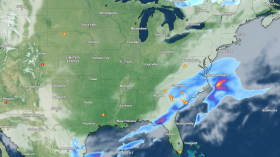Some natural processes caused by global warming are softening the full effects of climate change, scientists report. Researchers from the Hebrew University of Jerusalem, John Hopkins University and NASA's Goddard Space Flight Center found evidence of a negative feedback loop for global warming in the Indian and Pacific Oceans.
Rising ocean temperatures have led to increased evaporation into the atmosphere. Water's high heat capacity makes water vapor one of the most influential greenhouse gases, especially when it is present in the stratosphere. Israeli and US scientists have found evidence that increasing amounts of water vapor aren't making it up into the stratosphere.
In a detailed study in the Journal of Geophysical Research, scientists examined the interaction between temperature, water vapor and ozone trends in the tropical tropopause layer (TTL). The TTL rests above the troposphere and below the stratosphere, with characteristics of both regions and significant influence on both atmospheric chemistry and climate.
The TTL's influence comes partly from its ability to regulate the amount of water vapor entering the stratosphere. Therefore, the researchers said that understanding temperature change in the TTL is an important scientific question of significant societal relevance.
Satellite observations have shown the scientists that warming of the tropical Indian Ocean and tropical Western Pacific Ocean have actually caused the opposite cooling effect in the stratosphere above those regions. The increased amount of water vapor, and subsequent precipitation, is confined to near the surface of the ocean.
The cooling TTL is keeping water vapor from entering the stratosphere, causing the stratosphere to dry even while the troposphere remains wet. The scientists said that this effect may slightly weaken the dire predictions of Earth's increasingly warm climate.
© 2024 NatureWorldNews.com All rights reserved. Do not reproduce without permission.

![Origin of Life: Discovery of Lava Being a Building Block of Life Hints 'Humans Have Volcanic Origins' [Study]](https://1471793142.rsc.cdn77.org/data/thumbs/full/70262/280/157/50/40/origin-of-life-discovery-of-lava-being-a-building-block-of-life-hints-humans-have-volcanic-origins-study.jpg)
![Great White Sharks Observed for the First Time Changing Their Behavior in Different Marine Environments [Study]](https://1471793142.rsc.cdn77.org/data/thumbs/full/70251/280/157/50/40/great-white-sharks-observed-for-the-first-time-changing-their-behavior-in-different-marine-environments-study.jpg)


